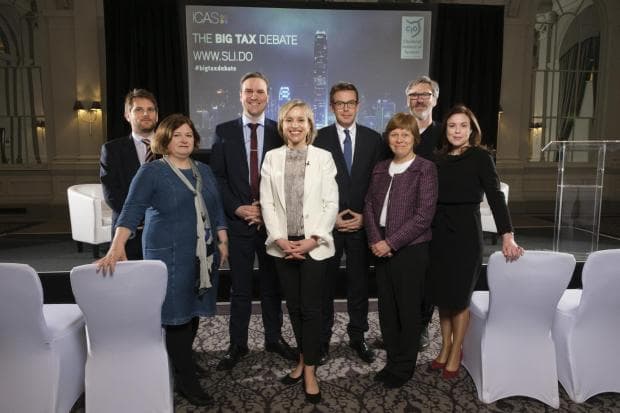Devolution evolution
The next twenty years of devolution will see a consolidation of Scotland’s devolved tax powers and the need for the Westminster and Holyrood governments to work together to ensure the health of the tax system.

That was one of the topics considered as part of the second CIOT/ICAS ‘Big Tax Debate’, which brought together a panel of politicians and commentators to debate and discuss Scotland’s tax regime earlier this month.
Chaired by broadcaster Rona Dougall, the panel included:
- Katrine Bussey – Political Editor of Press Association Scotland
- Robin McAlpine – Director of the Common Weal think-tank
- Tom Arthur MSP – SNP MSP for Renfrewshire South and a member of the Scottish Parliament’s Finance and Constitution Committee
- Adam Tomkins MSP – Conservative MSP for Glasgow and deputy convener of the Finance and Constitution Committee
Some of the themes discussed during the event included:
Tax is an enabler of a good society, but trust and confidence in the system is essential
Robin McAlpine said we needed to have a more impassioned debate around the role of tax in our society. He argued that taxation ranked among civilisation’s greatest achievements, even eclipsing the building of the pyramids.
Tom Arthur MSP said that tax was a “fundamental good” that gave people a stake in society.
But Arthur also noted that rising inequalities and cuts to public services had fostered a resentment among the general public that had manifested itself in the rise of populist movements and the election of Donald Trump in America and referendum to leave the European Union.
Adam Tomkins’ view was that the tax system was an enabler of economic growth. But he was concerned that tax divergence from the rest of the UK would have the opposite effect. He suggested that it could stifle economic growth and erode public trust in the tax system.
Katrine Bussey said that the media had a responsibility to keep the public informed when it came to the tax system. She said that they were not experts on the tax system, but their ability to ask questions of government and politicians could help to raise the profile of the subject.
Opinions divided on tax-motivated behaviour changes
The panel then debated the opportunities and challenges of tax divergence.
Adam Tomkins said that a responsible Scottish Parliament and Government needed to take heed of the potential impacts on taxpayer behaviour resulting from policy divergence. He said there was a growing realisation that differences between Scotland and the rest of the UK were beginning to have an effect, not necessarily with people choosing to leave Scotland, but with others choosing not to locate to the country.
Arthur disagreed, arguing that for the sake of £2.50 per week, taxpayers earning £40,000 per year were unlikely to move, especially if the benefits of Scotland’s social contract (free personal care, university tuition, eye and prescription charges) outweighed the additional costs of paying for those services south of the border.
McAlpine said that research on different tax regimes across the United States had found little evidence of tax-motivated behaviours. He said this should be an area of urgent research for Scotland.
But the audience disagreed, with a live poll conducted during the debate finding that 63 per cent of attendees felt that higher tax rates would act as a long-term disincentive.
Looking ahead to the next twenty years of devolution
This year marks the twentieth anniversary since the creation of the Scottish Parliament. With that in mind, the panellists were asked to reflect on how they saw Scotland’s tax raising powers developing over the course of the next twenty years.
Robin McAlpine said that local government would be the next frontier of devolution as councils demand greater autonomy over the money they raise. The current debates around the potential introduction of tourist taxes and parking levies – together with a Budget commitment to review local government finance – were highlighted as examples.
Adam Tomkins suggested that the debate would be less focused on new taxes and more on how the UK and Scottish Parliament’s make the most of their existing fiscal arrangements. He also said that the devolution of power from Holyrood to local councils was likely to rise up the agenda.
Katrine Bussey also hinted at the shift from national to local government, adding that the present tax raising powers needed to bed in before further change could be considered. Tom Arthur also said that as the Scottish Parliament matured, it was incumbent on politicians of all parties to live up to the spirit of the architects of devolution and work together to find solutions for the people of Scotland.
(Back row (L-R); Sean Cockburn (COT Scotland Hub chair), Tom Arthur MSP, Adam Tomkins MSP, Robin McAlpine. Front row (L-R); Katrine Bussey, Rona Dougall, Charlotte Barbour (Director of Tax - ICAS), Michelle Mullen (Executive Director, Standards - ICAS))
By Chris Young.
